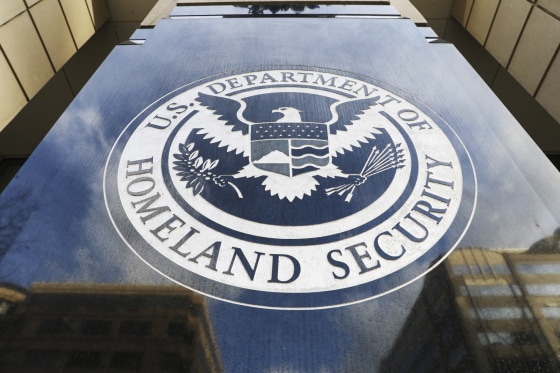The Trump administration has been turning to DNA technology to help find and arrest immigrants, including children, but immigration advocates say it has been slow to spell out how it's using and overseeing the genetic information.
Three groups sued the Department of Homeland Security on Monday after trying to get records about the data collection program since last summer, during the Biden administration.
The plaintiffs are the Georgetown Law Center on Privacy & Technology, part of the Georgetown University Law School that focuses on privacy and surveillance law and policy; the Amica Center for Immigrant Rights and Americans for Immigrant Justice, both immigrant rights groups.
The groups describe in their lawsuit their back-and-forth with DHS, Immigration and Customs Enforcement and Customs and Border Protection since they originally requested information about their DNA collection from noncitizens on Aug. 1, 2024.
Since 2020, DHS has expanded its DNA collection program and increased DNA contributions to the FBI's database, CODIS, by 5,000%, becoming the largest contributor, according to the Georgetown center. The DNA database of the FBI can be accessed by police across the country for criminal investigations, the plaintiff groups said in a statement.
Stevie Glaberson, director of research and advocacy at the Georgetown center, said in a statement that DHS is expanding its database by "collecting DNA from people accused of no crime and while operating with none of the constraints that are supposed to be in place before the government compels someone to give over their most sensitive personal information."
He said Americans deserve more visibility on the program and said DHS's lack of transparency is unacceptable.
DHS did not immediately respond to a request for comment.
Daniel Melo, senior staff attorney with Amica's Immigration Impact Lab, told NBC News that previous administrations have also collected DNA. A 2005 law mandated federal agencies collect DNA from people in custody, including noncitizens.
Prior to 2020, the Justice Department had told DHS that its immigration enforcement and border agents did not have to routinely collect DNA from every noncitizen it detained, Melo said. The Biden administration adopted rules requiring full compliance with the 2005 law, but whistleblowers and a government watchdog complained compliance was uneven.
The "Securing Our Borders" executive order signed by President Donald Trump requires the attorney general and the DHS to fulfill requirements on DNA collection from noncitizens mandated in the 2005 law.
'Sweeps in information about everyone'
Privacy and civil rights groups have long had issues with the government's DNA collection program. Melo said the public should be concerned whether people are being advised of their rights and how the information is being collected and used.
"This information could tentatively be used in all sorts of ways to map full communities, to basically build a more intricate web of surveillance around noncitizen communities," Melo said.
He said if DHS can continue to collect the DNA of noncitizens, essentially "experimenting" on them, "then they are able to refine these technologies and deploy them in new and interesting and probably really dangerous and scary ways on the rest of us."
Emily Tucker, the Georgetown center's executive director, said in a statement that "it is a mistake to think of DHS' DNA collection program as 'immigration enforcement.'"
"Trump is using immigration powers to justify the activities of his militarized federal police force because there is so little institutional or judicial oversight or accountability for executive enforcement actions that invoke ‘immigration authority," she said in a statement. "This program is one part of a massive surveillance dragnet that sweeps in information about everyone. They will use it for deportation, but they will also use it to intimidate, silence, and target anyone they perceive as the enemy.”

